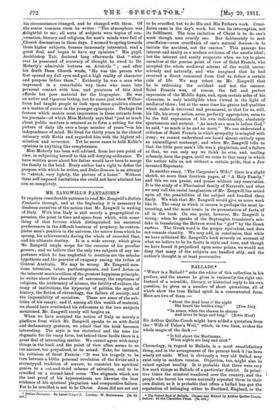MR. ZANGWILL'S FANTASIES.*
IT requires considerable patience to read Mr. Zangwill's Itakdn Fantasies through, and at the beginning it is necessary to disabuse ourselves of the notion that Mr. Zangwill is writing of Italy. With him Italy is still merely a geographical ex-
pression, the point in time and space from which, with some- thing of that fervour which distinguished his ancestral predecessors in the difficult business of prophecy, he contem- plates man's position in the universe, the source from which he sprang, his achievements during the whole of recorded time, and his ultimate destiny. It is a wide survey, which gives Zangwill ample scope for the exercise of his peculiar towers; and we believe that the only two subjects of any im- portance which he has neglected to mention are the nebular hypothesis and the practise of exogamy among the tribes of Central Australia. We may be wrong. Mr. Zangwill men- tions totemism, taboo, parthenogenesis, and Lord Acton on the inherent machiavellism of the greatest happiness principle; he writes about the absurdity of astronomy, the emptiness of religions, the irrelevancy of science, the futility of culture, the irony of institutions, the hypocrisy of politics, the myth of history, the fiction of chronology, the failure of society, and the impossibility of socialism. These are some of the sub- titles of his essays ; and if, among all this wealth of material, we should have overlooked his references to the two subjects mentioned, Mr. Zangwill surely will forgive us.
When we have accepted the notion of Italy as merely a platform from which Mr. Zangwill speaks to us with florid and declamatory gestures, we admit that the book becomes interesting. The style is too rhetorical and the tone too dogmatic for the essay form, but behind these faults there is a great deal of interesting matter. We cannot agree with many things in the book, and the point of view often seems to us too narrow, too prejudiced, to be sound. Take, for instance, his criticism of Saint Francis: "It was his tragedy to be torn between a blithe personal revelation of the divine and a stereotyped tradition of sorrow, to constrict his spiritual genius to a cut-and-dried scheme of salvation, and to be crucified on a second-hand cross. The stigmata which are the best proof of his hypertesthesia are likewise the best evidence of his spiritual plagiarism and comparative failure. For to be'crucified is not to be Christ. Jesus did not set out
• Italian Fantasies., By Israel London: W. Heineman. Os. 6d. net.]
to be crucified, but to do His and His Father's work. Cruci- fixion came in the day's work, but was its interruption, not its fulfilment. The true imitation of Christ is to do one's work though men crucify one. But deliberately to seek crucifixion—even crucifixion of one's natural desires—is to imitate the accident, not the essence." This passage has interest and sanity as a modern criticism of the ascetic ideal ; but the interest and sanity evaporate when we try to place ourselves at the precise point of view of Saint Francis, who accepted the whole mediaeval scheme of the world, uncon- sciously and naturally, and who imagined that he bad received a direct command from God to follow a certain rule of life. We may retort on Mr. Zangwill that he is criticizing the accident and not the essence. Saint Francis was, of course, the full and perfect expression of the Middle Ages, and, upon certain sides of his character, is only intelligible when viewed in the light of medieval ideas ; but at the same time his genius had qualities which make it universal and permanent, so that for us, still, his life, his every action, seem perfectly appropriate, seem to be the full expression of his own individuality, absolutely spontaneous and natural. " As much as a man is before God," he said, " so much is he and no more." We can understand a criticism of Saint 'Francis in which sympathy is mingled with irony ; we cannot understand one based almost entirely upon an unintelligent contempt; and when Mr. Zangwill tells us that the little poor man's life was a plagiarism, and a failure at that, we can only say we think he errs, and, smiling urbanely, turn the pages, until we come to that essay in which the author tells us, not without a certain pride, that a Jew invented Esperanto.
In another essay, "The Carpenter's Wife," there is a slight sketch, no more than fourteen pages, of " A Holy Family," and this we can praise, and praise without any reservation. It is the study of a Pharisaical family of Nazareth, and what we may call the racial imagination of Mr. Zangwill has seized upon all the possibilities of the subject and handled them finely. We wish that Mr. Zangwill would give us more work like it. The essay in which it occurs is perhaps the most in- teresting, and the most ironic in its presentation of facts, of all in the book. On one point, however, Mr. Zangwill is wrong : when he speaks of the Septuagint translator's mis- take in translating the Hebrew word for " girl " by the Greek TapGros. The Greek word is the proper equivalent, and does not connote chastity. We may add, in conclusion, that while we have criticized Mr. Zangwill's book severely on account of what we believe to be its faults in style and tone, and though we have found it prejudiced upon some points, we would not deny that many of the subjects are handled ably, and the author's thought is at least provocative.








































 Previous page
Previous page